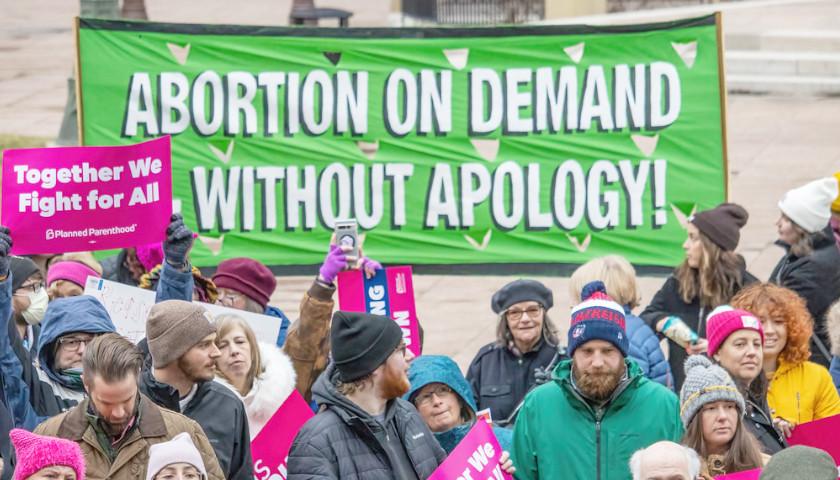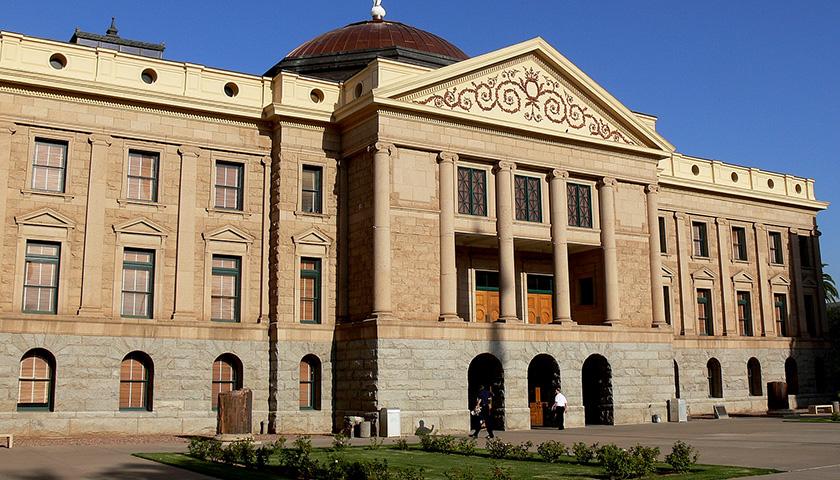The Arizona Supreme Court issued a 4-2 ruling Tuesday upholding Arizona’s 1864 territorial ban on all abortion unless necessary to save the mother’s life, A.R.S. 13-3603. After the Arizona Legislature passed a law in 2022 banning abortions after 15 weeks except to save the mother’s life, A.R.S. 36-2322, Planned Parenthood challenged the older law, which was revived after the U.S. Supreme Court struck down Roe v. Wade.
Planned Parenthood alleged that the two laws were in conflict, so the earlier law must be struck down. After a split between the lower courts, the Arizona Supreme Court upheld the law, finding that the two statutes were harmonious. The court relied upon legislative language accompanying the newer law, which said it did not supersede the earlier law. Both laws penalize the provider of the abortion, not the mother.
The Arizona Freedom Caucus (AFC), composed of conservative members of the Arizona Legislature, issued a unanimous statement praising the decision and criticizing politicians who issued statements calling upon the legislature to revise the older law to make it less restrictive.
“Sadly, it seems that some are choosing to reject the fundamental, core principle of protecting life,” the statement said. “Some have chosen instead to jump on the bandwagon to legalize unrestricted abortions for the first 15 weeks of pregnancy — a position that would permit 95% of all existing abortions to continue. This is unacceptable, morally wrong, and abrasively out of step with the central tenants of the Republican Party Platform and Republican voters. Murdering children is not a policy disagreement. Democrat politicians’ infatuation with murdering children is evil. The Arizona Freedom Caucus refuses to participate in, or sit idly by in the face of, that evil.”
🚨 STATEMENT ON ARIZONA SUPREME COURT’S PRO-LIFE RULING 🚨
Today, the Supreme Court of Arizona made the correct ruling, upheld the intent of the legislature, and preserved the rule of law today by ruling that the pre-Roe law will remain effective.
Protecting the lives of… pic.twitter.com/SPbr7Bamhe
— Arizona Freedom Caucus (@AZFreedomCaucus) April 9, 2024
State Senator Jake Hoffman (R-Queen Creek), chair of the AFC, added on X, “I am pro-life. This is not a principle I will compromise on. I’m proud that the @AZFreedomCaucus stands unanimously united on this issue. Murdering children is not a policy disagreement. It is evil. We refuse to participate in, or sit idly by in the face of, that evil.”
State Senator Wendy Rogers (R-Flagstaff) agreed, posting on X, “LIFE must be upheld in the laws of the land. I will vote against any laws that would diminish life in Arizona, including any laws that would dilute our existing statutes. Defending life is the right thing to do. #ProLife”
Arizona Supreme Court Justice John R. Lopez wrote the opinion for the majority, joined by Justices Clint Bolick, James Beene, and Kathryn King. Vice Chief Justice Ann Timmer, known as the progressive on the court, authored a dissenting opinion, joined by Chief Justice Robert Brutinel. Brutinel is retiring soon. Justice Bill Montgomery recused himself due to his past involvement in pro-life issues.
The opinion said the “question presented is different from those arising in the ordinary statutory interpretation context: whether the later statutes ‘repeal or otherwise limit’ the earlier statute. Neither party could identify precedent squarely resolving such an unusual circumstance.”
In order to decide the novel situation, the court opined, “If the statutory language is ambiguous — if ‘it can be reasonably read in two ways’ — we may use alternative methods of statutory construction, including examining the rule’s historical background, its spirit and purpose, and the effects and consequences of competing interpretations.”
The 2022 law was passed before the U.S. Supreme Court reversed Roe v. Wade in Dobbs v. Jackson. Planned Parenthood argued that the law created a right to an abortion.
The court responded, “We first address Planned Parenthood’s claim that Title 36 creates a right to an abortion or otherwise independently authorizes elective abortion up to fifteen weeks’ gestation. Although Planned Parenthood conceded at oral argument that Title 36 does not create a right to abortion, it maintained its argument that § 36-2322 codifies permissive authorization to perform abortions such that it repeals or restricts § 13-3603. Planned Parenthood and Hazelrigg’s Title 36 arguments center almost entirely on § 36-2322.”
Dr. Eric Hazelrigg, medical director of a chain of pro-life clinics, was an intervenor in the case.
The opinion went on, “Planned Parenthood is correct that if it were a standalone statute, by its plain terms, § 36-2322’s proscription on elective abortion after fifteen weeks’ gestation logically implies that abortion is otherwise permissible. But its interpretation that the purpose and effect of ‘except’ and ‘unless’ is to statutorily authorize certain abortions is not the only reasonable one. Reasonable minds could differ about whether ‘except’ and ‘unless’ independently statutorily authorize conduct not proscribed or, alternatively, merely qualify the circumstances under which a physician may be penalized under § 36-2322.”
The court declared, “S.B. 1164 was not a legislative attempt to preserve a right to abortion in Arizona; instead, it was a significant legislative restriction on elective abortion.”
The court heavily relied on the language accompanying the bill.
“The legislature included a two-part construction provision in S.B. 1164, expressing its unequivocal intent that, in restricting elective abortion to fifteen weeks’ gestation, it did not create, recognize, or expand a right to an abortion, nor did it repeal § 13-3603’s proscription on elective abortion: This act does not: 1. Create or recognize a right to abortion or alter generally accepted medical standards. The Legislature does not intend this act to make lawful an abortion that is currently unlawful. 2. Repeal, by implication or otherwise, section 13-3603, Arizona Revised Statutes, or any other applicable state law regulating or restricting abortion.”
The court also refuted the argument that because there was no “trigger provision” in the law to accommodate the possibility of the U.S. Supreme Court overruling Roe v. Wade, that the law created a right to an abortion. “[T]he absence of an express trigger provision is not dispositive here. … Despite the dissent’s requirement of an express trigger provision, infra ¶¶ 93–96, we conclude that the legislature made its intent known.”
The court added, “Any portion of Title 36 solely applicable to elective abortion under the defunct federal constitutional right arguably may no longer be operative simply for want of purpose; what does not exist cannot be regulated.” The court said it was only making a limited decision, and leaving the issue primarily up to the people. “The enforceability of Title 36 provisions must be revisited by the legislature or adjudicated by the courts as controversies arise.”
The court relied on the U.S. Supreme Court decision United States v. Batchelder, which held that “it is ‘not enough to show that the two statutes produce differing results when applied to the same factual situation. … Rather, the legislative intent to repeal must be manifest in the ‘positive repugnancy between the provisions.’”
The opinion was dismissive of the dissent.
“The dissent’s reasoning is tenable only to the extent that it discounts statutory history, the legislature’s public policy pronouncement in § 1-219(A), and the construction provision that the legislature did not intend § 36-2322(B) to ‘repeal, by implication or otherwise, section 13-3603,’” the court stated. “It is the dissent’s interpretation — deliberately blind to Arizona’s relevant statutory history, public policy pronouncement, and the legislature’s explicit construction provision contradicting the dissent’s conclusion — that is strained.”
The court said, “In light of this Opinion, physicians are now on notice that all abortions, except those necessary to save a woman’s life, are illegal, see § 13-3603, and that additional criminal and regulatory sanctions may apply to abortions performed after fifteen weeks’ gestation.”
The court emphasized again that it was leaving most of the issue up to the people. “A policy matter of this gravity must ultimately be resolved by our citizens through the legislature or the initiative process,” the justices said. “Today, we decline to make this weighty policy decision because such judgments are reserved for our citizens. Instead, we merely follow our limited constitutional role and duty to interpret the law as written. … We defer, as we are constitutionally obligated to do, to the legislature’s judgment, which is accountable to, and thus reflects, the mutable will of our citizens.”
The court ordered, “We remand the case to the trial court for consideration of those additional constitutional challenges if the plaintiffs wish to pursue them, and we temporarily extend the existing stay against enforcement of § 13-3603 so that the trial court may determine how to proceed.”
Arizona Attorney General Kris Mayes has said she will not enforce the older law, and other county attorneys are expected to follow suit. A radical pro-abortion proposition is expected to gather enough signatures to be on the fall ballot, which some Republican politicians think they can thwart by passing legislation repealing the territorial law.
– – –
Rachel Alexander is a reporter at The Arizona Sun Times and The Star News Network. Follow Rachel on Twitter / X. Email tips to [email protected].
Photo “Abortion Supporters” by Becker1999. CC BY 2.0.





